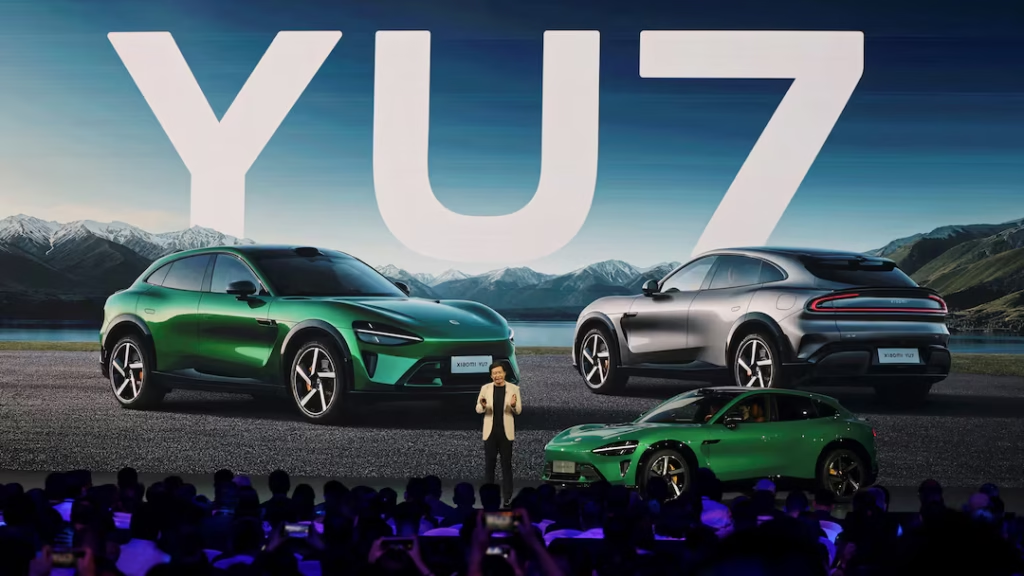Xiaomi’s much-anticipated leap into the electric SUV space has turned into a full-blown market disruption. Just minutes after opening pre-orders for the YU7, the internet went into a frenzy. Enthusiasts, early adopters, and tech loyalists swarmed booking platforms, pushing order numbers past the 200,000 mark in under three minutes. Within the hour, Xiaomi’s new SUV had clocked nearly 290,000 orders—staggering by any industry standard.
For Tesla, this wasn’t just another car launch—it was a thunderous signal that a formidable new player has entered the arena with both ambition and execution.
A Calculated Strike: Undercutting Tesla on Value
Xiaomi’s strategy was no coincidence. The YU7 is priced deliberately below Tesla’s Model Y, its most popular SUV. But more than a price war, Xiaomi positioned the YU7 as a smarter buy—offering a longer certified driving range, cutting-edge features, and a tightly integrated user ecosystem.

The YU7 boasts an impressive top-tier battery range and acceleration performance that outpaces many competitors in its class. This, combined with Xiaomi’s sleek design language and software-friendly in-car interface, creates a compelling value proposition that Tesla will find hard to ignore.
Scalpers, Crashes, and Frenzy: Demand Hits Boiling Point
The YU7 rollout wasn’t just a hit—it was chaotic. Online booking platforms struggled to handle the overwhelming traffic. Meanwhile, scalpers began capitalizing on the frenzy by reselling early order slots on secondary markets.
This wave of artificial demand even led Xiaomi to limit purchases to two units per buyer, in an effort to ensure fair access and curb speculative buying. But the damage—or success—was done. The YU7 had officially become the hottest electric vehicle of the moment.
From Newcomer to Disruptor: Xiaomi’s Rapid Auto Rise
Just a year ago, Xiaomi was an automotive outsider. Known for its smartphones and smart home devices, its entry into the EV world was seen by many as experimental. But its first model, the SU7 electric sedan, had already shaken up the segment by overtaking Tesla’s Model 3 in sales.
With the YU7, Xiaomi is no longer experimenting—it’s asserting dominance.
What makes this rise even more notable is the pace. In less than twelve months, Xiaomi has launched two highly competitive electric vehicles that are not only well-designed but also well-priced, heavily featured, and deeply connected to a larger smart ecosystem.
Tesla in the Crosshairs: Market Share Faces Pressure
Tesla’s dominance in China has been slipping. While still a respected and admired brand, its slice of the electric vehicle pie has been steadily chipped away by domestic competitors. Xiaomi, however, brings something unique—tech pedigree, massive brand loyalty, and an aggressive pricing model.
With the YU7 now threatening to become a bestseller, Tesla may be forced to respond. Industry insiders speculate Tesla could announce pricing cuts, new features, or promotional incentives to hold onto its customer base. In the short term, the brand may weather the storm—but in the long term, Xiaomi’s entry could permanently alter the market landscape.
A Global Ambition Takes Shape
Xiaomi’s vision doesn’t stop at the Chinese border. While initial production is being fulfilled locally, the company has hinted at expansion into Europe and other emerging EV markets. If Xiaomi can replicate its pricing model internationally—potentially undercutting Tesla by 15–20% in key markets—it could open a new front in the EV wars.
Manufacturing capacity is already being scaled up, with plans to build additional factories to meet growing demand. The goal is clear: dominate at home, then disrupt abroad.
Beyond the Car: A Smart Ecosystem on Wheels

One of Xiaomi’s most potent advantages is its integration across smart devices. The YU7 doesn’t just offer an electric ride—it’s a rolling extension of your Xiaomi ecosystem. From in-car entertainment to AI-driven controls and seamless sync with Xiaomi smartphones and home devices, the car blurs the line between transport and tech.
This deep integration allows Xiaomi to build a user experience that goes far beyond driving. For loyal Xiaomi users, the YU7 feels less like a switch in brands and more like a natural extension of their digital lifestyle.
The Product Itself: Speed, Range, and Style
Xiaomi’s YU7 isn’t winning on hype alone—it delivers on the fundamentals. With a sharp exterior, smart interior layout, and high-speed performance that rivals top-tier EVs, it’s built to impress.
The vehicle comes in three variants—Standard, Pro, and Max—offering both rear-wheel and all-wheel drive configurations. With rapid acceleration, advanced battery technology, and extended range capabilities, it’s clear Xiaomi isn’t just making affordable EVs—it’s making desirable ones.
The YU7’s interior boasts a user-centric layout with expansive screen real estate, adaptive lighting, and an immersive cabin experience. Every detail, from seat stitching to infotainment responsiveness, has been fine-tuned to appeal to tech-savvy drivers.
Factory Push: Building for Scale
With demand outpacing projections, Xiaomi has moved fast to ramp up production. Its existing plants are operating at near-maximum capacity, and new investments have been made to secure more land and materials for an additional facility.
The goal is to hit a production target that supports both the domestic market and future international launches. Xiaomi is also reportedly streamlining supply chain partnerships to avoid delays and reduce dependence on single-source vendors. This approach reflects a deep understanding of the automotive sector and a readiness to play long-term.
Public Sentiment: Hype, Hope, and High Expectations
The excitement surrounding the YU7 isn’t just corporate buzz—it’s palpable among consumers. Social media is flooded with testimonials, unboxing-style content, and pre-order celebrations. Many buyers cite the car’s unique combination of affordability, performance, and smart integration as the reason they jumped ship from other brands.
Some former Tesla customers are even considering switching—or purchasing the YU7 as a secondary vehicle for family members. The narrative is shifting: Xiaomi isn’t just winning first-time EV buyers; it’s winning converts from the competition.
What This Means for the EV Industry
Xiaomi’s explosive entry into the electric SUV segment signifies a new phase in the EV revolution—one where tech companies might just become the leading automakers of the future.

The traditional auto giants, already struggling to adapt, now face competition from nimble, innovation-driven firms that understand consumer tech better than anyone. Tesla, long the darling of the tech-meets-auto narrative, now finds itself competing against a company that has been mastering ecosystem thinking for over a decade.
The message is clear: the future of cars isn’t just electric—it’s smart, connected, and platform-driven.
The Road Ahead: Xiaomi’s Next Moves
The YU7 may just be the beginning. Xiaomi has teased upcoming models, hinted at global variants, and is actively recruiting talent from across the EV and tech sectors. The company’s next steps could include:
- Launching a sub-brand for international markets
- Introducing smaller or luxury EVs
- Partnering with ride-hailing or subscription platforms
- Expanding in-car software and autonomous driving features
- Leveraging AI to create predictive, adaptive car environments
If Xiaomi executes these steps with the same precision as the YU7 launch, it could reshape not only how cars are made and sold—but how we think of mobility altogether.
Final Thoughts: Game On
The launch of the YU7 is more than a commercial success—it’s a declaration of intent. Xiaomi has proven it can not only enter the automotive sector but lead it. With unmatched pre-order numbers, aggressive pricing, and deep tech integration, it has forced every player in the EV space to take notice.
Tesla, for all its innovation and market clout, now faces a new kind of rival—one that understands consumers at the micro level, delivers on product promises, and plays to win. The EV war is no longer just about batteries and motors. It’s about ecosystems, scale, and customer connection.
And Xiaomi, it seems, is just getting started.
Do follow UAE Stories on Instagram
Read More: Top Paid VPNs That Work Reliably in the UAE













